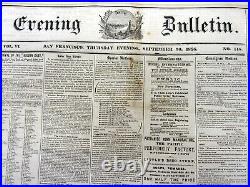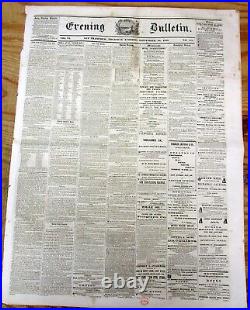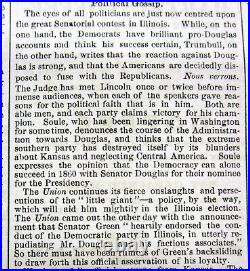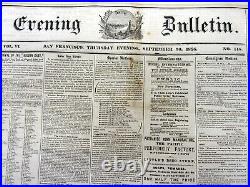




1858 San Francisco CALIFORNIA newspaper ABE LINCOLN DEBATES DOUGLAS in ILLINOIS. 1858 San Francisco CALIFORNIA newspaper ABRAHAM LINCOLN DEBATES STEPHEN A DOUGLAS in the ILLINOIS Senate political race. Inv # 8R-423. SEE PHOTO(s) – COMPLETE ORIGINAL NEWSPAPER, the. San Francisco Evening Bulletin. (CA) dated Sept 30, 1858. This original newspaper contains an inside page headline: “POLITICAL GOSSIP” with news of the. LINCOLN-DOUGLAS DEBATES in Illinois that brought Illinois native Abraham Lincoln to be widely known by the public nation-wide. The Lincoln-Douglas debates were a series of seven debates between Abraham Lincoln, the Republican Party candidate for the United States Senate from Illinois, and incumbent Senator Stephen Douglas, the Democratic Party candidate. Until the Seventeenth Amendment to the United States Constitution, which provides that senators shall be elected by the people of their states, was ratified in 1913, senators were elected by their respective state legislatures, so Lincoln and Douglas were trying to win the votes of the Illinois General Assembly for their respective parties. The debates were designed to generate publicity-some of the first examples of what later would be called media events. For Lincoln, they were an opportunity to raise both his national profile and that of the burgeoning Republican Party, while Douglas sought to defend his record-especially his leading role in the doctrine of popular sovereignty and its incarnation in the Kansas-Nebraska Act of 1854. The candidates spoke in each of Illinois’s nine congressional districts. Both candidates had already spoken in Springfield and Chicago within a day of each other, so they decided that their joint appearances would be held in the remaining seven districts. Since Douglas was the incumbent he had very little to gain from these debates. However, Lincoln, only a one term congressman, was gaining support by speaking a day after Douglas and thus presenting a rejoinder Douglas could not answer. Furthermore, The Lincoln newspapers [those papers which formally supported Lincoln] wasted no time in condemning Douglas for not agreeing to the debates and branded him a coward. Political debates were part of the Prairie tradition and any serious political candidate was expected to put on a fine performance. Each debate lasted about three hours; one candidate spoke for 60 minutes, followed by a 90-minute response and a final 30-minute rejoinder by the first candidate. The candidates alternated speaking first. As the incumbent, Douglas spoke first in four of the debates. They were held outdoors, weather permitting, from about 2 to 5 p. There were fields full of listeners. Douglas, as the Democratic candidate, held that the decision should be made by the residents of the new states themselves rather than by the federal government (popular sovereignty). Lincoln argued against the expansion of slavery, yet stressed that he was not advocating its abolition where it already existed. Never in American history had there been newspaper coverage of such intensity. Both candidates felt they were talking to the whole nation. New technology was readily available: railroads, the telegraph, and Pitman shorthand, at the time called phonography. The state’s largest newspapers, from Chicago, sent phonographers (stenographers) to report complete texts of each debate; thanks to the new railroads, the debates were not hard to reach from Chicago. Halfway through each debate, runners were handed the stenographers’ notes. They raced for the next train to Chicago, handing them to riding stenographers who during the journey converted the shorthand back into words, producing a transcript ready for the Chicago typesetter and for the telegrapher, who sent it to the rest of the country (east of the Rockies) as soon as it arrived. The next train brought the conclusion. Some newspapers helped their own candidate with minor corrections, reports on the audience’s positive reaction, or tendentious headlines New and Powerful Argument by Mr. Lincoln-Douglas Tells the Same Old Story. The newswire of the Associated Press sent messages simultaneously to multiple points, so newspapers all across the country (east of the Rocky Mountains) printed them, and the debates quickly became national events. They were republished as pamphlets. The debates took place between August and October 1858. Newspapers reported 12,000 in attendance at Ottawa, 16,000 to 18,000 in Galesburg, 15,000 in Freeport, 12,000 in Quincy, and at the last one, in Alton, 5,000 to 10,000. The debates near Illinois’s borders (Freeport, Quincy, and Alton) drew large numbers of people from neighboring states. A number travelled within Illinois to follow the debates. Douglas was re-elected by the Illinois General Assembly, 54-46. But the publicity made Lincoln a national figure and laid the groundwork for his 1860 presidential campaign. This listing includes the complete entire original newspaper, NOT just a clipping or a page of it. Every item we sell is an original newspaper printed on the date indicated at the beginning of its description. This is truly SIX CENTURIES OF HISTORY that YOU CAN OWN! Goldman is a consultant to the Freedom Forum Newseum and a member of the American Antiquarian Society. Let our 50+ years of experience work for YOU! We have hundreds of thousands of historical newspapers (and their very early precursors) for sale. We are located in the charming Maryland Eastern Shore town of OXFORD, Maryland. With an inventory of nearly a million historical newspapers (and their early precursors) we are likely have just the one YOU are searching for. WE ARE ALSO ACTIVE BUYERS OF HISTORICAL NEWSPAPERS, including large and small personal collections, bound volumes, significant individual issues, or deaccessions from libraries and historical societies. Powered by SixBit’s eCommerce Solution.

